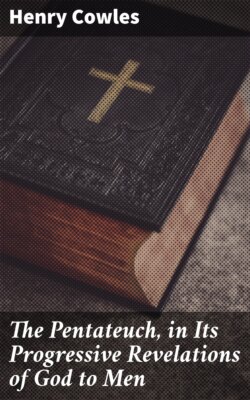The Pentateuch, in Its Progressive Revelations of God to Men

Реклама. ООО «ЛитРес», ИНН: 7719571260.
Оглавление
Henry Cowles. The Pentateuch, in Its Progressive Revelations of God to Men
The Pentateuch, in Its Progressive Revelations of God to Men
Table of Contents
PREFACE
INTRODUCTION. THE REVELATIONS OF GOD TO MEN PROGRESSIVE
CHAPTER I. CREATION
CHAPTER II. THE ANTIQUITY OF MAN
CHAPTER III. HEBREW CHRONOLOGY
CHAPTER IV. THE ANTIQUITY OF MAN RESUMED
CHAPTER V. THE SABBATH
CHAPTER VI. THE EVENTS OF EDEN
CHAPTER VII. FROM THE FALL TO THE FLOOD
CHAPTER VIII. THE FLOOD
CHAPTER IX. FROM THE FLOOD TO THE CALL OF ABRAHAM
CHAPTER X. ABRAHAM
CHAPTER XI. THE PATRIARCHS
CHAPTER XII. EXODUS
CHAPTER XIII. THE PASSOVER
CHAPTER XIV. THE HISTORIC CONNECTIONS OF MOSES WITH PHARAOH AND EGYPT
CHAPTER XV. THE EVENTS NEAR AND AT SINAI
CHAPTER XVI. THE HEBREW THEOCRACY
CHAPTER XVII. THE CIVIL INSTITUTES OF MOSES; OR THE HEBREW CODE OF CIVIL LAW
CHAPTER XVIII. THE CIVIL INSTITUTES OF MOSES, CONTINUED
CHAPTER XIX. THE RELIGIOUS SYSTEM OF THE HEBREWS
CHAPTER XX. HISTORIC EVENTS OF HEBREW HISTORY FROM SINAI TO THE JORDAN
CHAPTER XXI. THE LAST FOUR BOOKS OF THE PENTATEUCH: THEIR METHOD OF ARRANGEMENT AND SUBJECT-MATTER
Advertisements
Footnotes
Отрывок из книги
Henry Cowles
Published by Good Press, 2021
.....
In the Hebrew verb regard must be had to its form, technically called its “conjugation,” since the sense of the several conjugations from the same root may vary widely. In this verb (bara) the sense of Hiphil conjugation is to fatten—which is very remote from the sense of “Kal” and of its passive “Niphal.” In Piel only do we find the etymological sense to cut, to carve out (five times only) and these spoken of human operations exclusively (Josh. 17:15,18 and Ezek. 23:47 and 21:19). But in Kal and its passive Niphal, we find the word used forty-eight times, and always of divine operations—always of some form of creative work wrought by God himself and never by man.6
The testimony therefore from usage is entirely conclusive to the point that this word in this form of it was specially appropriated to signify God’s creative acts—the exertion of his creative power.——There are two other Hebrew words having the sense to make, to form, [asah and yatsar], which are sometimes used of God as creating but by far most often of man’s work in forming and molding material things. Now note the argument. The Hebrews had these three words for making, out of which one only is used exclusively of God—never of man—as a maker. Now there is one special sense in which God can make and man can not, viz. that of bringing into existence what had no existence before. Over against this, place the fact that their word “bara” is used of God’s making forty-eight times and of man’s making never, and we must conclude that they expressed by this word that distinctive power of God which man never can even approach—viz. the power to give existence to matter, to mind and to life. In passages where this sense of “bara” is appropriate, there can be no question that it is the real meaning.
.....